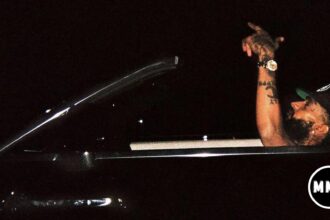Fast Break is a Slow Burn on Progress.
Music. Movies. Hoops.
Three of the biggest things that got us through 2020. Also three of the most important reflection points any culture uses to evaluate progress.
Music went from basic drums and strings, eventually went electric, and today, the soundtracks of our lives are entering the legal drinking age of the digital era. CGI and the movie industry have transformed themselves several times over since moving into the color picture era of invasive, yet engaging marketing for cutting-edge releases. Movies became sequel-suggestive universes and albums became Spotify wraps. (I haven’t watched, but one comic book movie since Val Kilmer and Danny Devito were in Batman, and that was only because Joker was dark enough to pique my curiosity.)
Then there is hoops, basketball. There was the adoption of the three-point line and the shot clock followed by zone defenses and stretch fours. The NBA Finals were tape-delayed until Magic and Bird went primetime then went pro, and it’s in that order doubt ye not. Then came Michael Jordan at UNC and Chicago, with a statement about Republicans buying shoes and trip to Washington D.C sprinkled in.
Then came Kobe. We all still shed tears when his name is mentioned, but we hold them in as much as we can because the Girl Dad was also the Black Mamba.
Now we have LeBron James, with a coat-tailing Anthony Davis, winning another NBA Finals trophy in the NBA’s Orlando Bubble. That same bubble had games postponed and very public statements supporting the fight for Civil Rights amid a time of social unrest.
But what’s that got to do with the 1979 movie Fast Break that featured Bernard King, Gabe Kaplan, and the film debut of Lawrence Fishbourne? Everything, if you see the progression of the movies, music, and hoops examples above. Go watch Fast Break—I’m almost sure you haven’t—and tell me that movie did not have a voice that was 40 years ahead of its time.
Listen to the songs “With You I’m Born Again” or “Go For It” by Billy Preston and Syreeta. They still speak to the struggles of today, same as most classics, and Fast Break is no exception. The way it did so was ahead of its time, even if the movie was billed as a ‘comedy’ for marketing purposes.
Fast Break as a comedy is easy to break down. A 5’ nothing, aspiring coach with a curled basketball head of hair wants to lead a college team. He sends letters to schools while working at a deli to appease his wife and pay his bills. He eventually gets an offer to coach at Cadwallader in Nevada. The paltry offer is $60/win over a 30-game season, but with a promise of a big payday should the team beat a top 10 in-state opponent, Nevada State.
However, any deeper dive into the plot reveals this is a drama, if not a tragedy. Kaplan’s character, coach David Greene, mulls the offer then asks a couple of questions: Where should the players be recruited from and how much was the administration concerned with academic standards? Cadwallader is only investing in their basketball team to make national headlines. So Coach can recruit from anywhere and the players will be immune to academic concerns. Once that agreement is made, Greene plucks players from his old junior high coaching network days in New York City. In one scene pointing to the double-edged sword of segregation in the 1970s, a rival coach with three black players derides Coach Greene for having four.
Coach Greene is just one dynamic. Hustler (played by Bernard King) has all the on-court skills, but starts the movie as a pool hustler just shooting any shots he can to pay the bills. That game runs out locally, so he has to think about a bigger world. Coach Greene has an opportunity away from the only struggles he’s ever known, but Hustler wants to bring along the only friends he has ever had. This is always a recipe for trouble, and at the least keeps players in a protective bubble that shields them from the challenges that stimulate personal growth. Still, it was Hustler playing his own game and not being dictated by the powers that be that got him and Coach the opportunity they wanted.
Just look at who Hustler and Greene recruit to join them at Cadwallader. D.C. is a former high school star with hundreds of offers, but none that beat the salary of running numbers and pickup game gambles in Brooklyn. The Preacher is using the church as a front and eventually finds himself caught up in other legal troubles. Apparently, he was two years older than his girlfriend in the wrong state, and she was a part of the wrong family for him to double-cross. He had turned to the Lord, but the law and her Uncle Larry might soon turn their attention to him. Better to get out of town. Just goes to show, no matter where you are in the world, you play the game you know how to play.
You hope to play it with people you can trust. The fourth player recruited, Swish, gets convinced to portray herself as a male in order to play on the team. She was asked to deny her identity for the betterment of the team, her friends, and her community. It was safer for everyone if she was one person at home and another in public. (Without research, I think it was Ladybugs with Rodney Dangerfield that finally took the dynamic the other way, decades later.) But the twist with Swish—removing her tightly wound ACE bandages hiding her breasts—was only part of the story.
D.C. is attracted to Swish, but thinking there might be a problem, D.C. decides to use some other problem as a reason to skip town and avoid his feelings. Coach Greene then ‘outs’ Swish. D.C. then goes to Swish and I’m not sure what 1979 called it, but I saw it as a very boundary-dropping, role-redefining scene. I don’t want to say much more, for the risk of spoilers on a 1979 movie and for going far outside my understanding of the subject. All I’ll say is that D.C. and Swish use pronouns and identifiers in ways that were not to be seen in regular society for another 30 years.
Furthermore, the movie throws out scenes that acknowledge the underhanded practices of NCAA sports. The Nevada State coach had a choir boy reputation, but some highly illegal investigations were overlooked by a knowing Coach Greene in order to induce the Nevada State coach into a pool game with Hustler. After Greene and Hustler run the end bosses gambling tab up to $5000, they made him a deal. One more game. Win and the debt is cleared—meaning Greene and Hustler are broke and heading back to Brooklyn—lose and Nevada State has to play Cadwallader. Of course, Hustler hustles as hustlers do.
Eventually, a hitman comes for Preacher and the law comes for D.C. However, the hitman is taken care of and the law is taken up to the Presidential Suite for the finest bourbon west of Tennessee. This brings us to our final point. Universities are acting like corporations, coaches are middle managers trying to gain leverage, and the players are the overworked, underpaid employees. This dichotomy goes far beyond the NCAA or any particular economic system. The institutions looking to reap the rewards of national attention and application fees (or political power and tax bases) are the same that will exploit those bringing in the attention and dollars. Looking at a 1979 movie from almost-2021 lenses, Fast Break shows how those being oppressed can fight back, but also how far we’ve had to go to say we moved forward.
Just go watch any extended scene from Fast Break. It will make you think about how the world was, how the world is, and how we want the world to be. If that’s not an inspirational movie that stands the test of time I do not know what is. Fast Break is definitely a great gauge of how far we have come as a society and within the Music, Movies, and Hoops Venn diagram subculture. Also, Fast Break just happens to be a great basketball movie.







